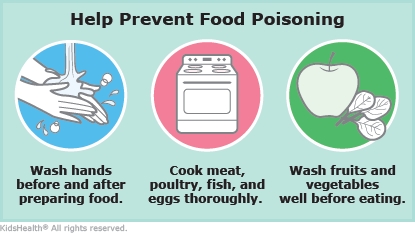Food poisoning is when someone gets sick from eating food that contains germs. Most of the time, food poisoning goes away on its own in a day or two.

How do germs get into food? Germs (such as bacteria, viruses or parasites) can get into food in different ways, including when:
- Germs from animal or human poop get into the water used to grow food.
- Meat or poultry touches germs during processing or shipping.
- Cooks or other food handlers don't wash their hands or don't use clean utensils or cutting boards.
- Food is stored at the wrong temperature or kept too long.
When do symptoms start after someone eats contaminated food? Food poisoning symptoms might start a few hours after someone eats infected food. But sometimes, a person doesn't feel sick until days or even weeks later.
How can we prevent food poisoning? To help prevent food poisoning:
- Wash hands with soap and warm water (scrub well for 15 seconds):
- after using the bathroom
- before eating
- before and after preparing food
- Cook meat, poultry, fish and eggs thoroughly.
- Wash cutting boards and utensils thoroughly with soap and warm water (or use a dishwasher) after preparing raw meat, fish, poultry or eggs.
- Keep raw meat, poultry, fish (or their juices) and eggs away from other foods.
- Wash fruits and vegetables well before eating.
- Do not let cooked foods or foods that need to stay cold (such as milk or uncooked meat) stay out at room temperature for more than 2 hours (1 hour if the room temperature is above 90ºF [32.2ºC]).
- Do not give honey to babies younger than 1 year old.
- Make sure that your child's immunizations are up to date.




